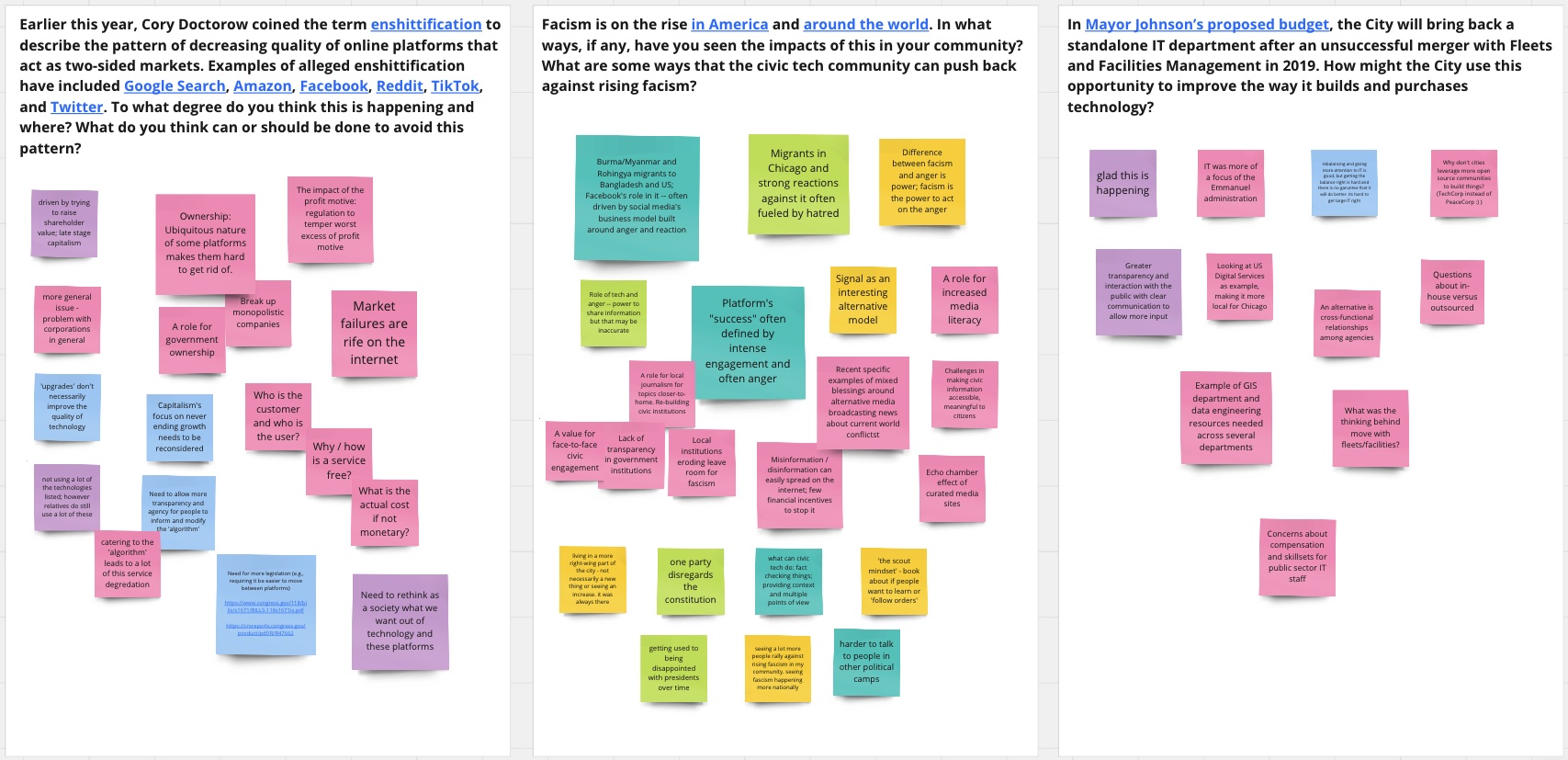October 2023 Community Feedback Session: Decaying platforms, rising fascism, and government response
Published on Oct 29, 2023 by Derek Eder

On October 24, 2023, Chi Hack Night hosted a facilitated group conversation with 20 members of our civic tech community about the role of technology and data in our society. In this, our seventh Community Feedback session, we focused our discussion on events and trends going on outside of Chi Hack Night and how the civic tech community might respond to them.
The facilitated discussion was structured around three prompts. Below are the prompts, and a summary of our conversations for each:
Prompt 1
Earlier this year, Cory Doctorow coined the term enshittification to describe the pattern of decreasing quality of online platforms that act as two-sided markets. Examples of alleged enshittification have included Google Search, Amazon, Facebook, Reddit, TikTok, and Twitter. To what degree do you think this is happening and where? What do you think can or should be done to avoid this pattern?
Discussion themes:
- The impact of the profit motive: many of these platform changes are seemingly driven by trying to raise shareholder value. Capitalism’s focus on never ending growth needs to be reconsidered. Is this a more general issue? A problem with corporations in general and late stage capitalism? Market failures are rife on the internet.
- Regulation: Can regulation temper the worst excess of profit motives? Should we break up monopolistic companies? Is there a role for government ownership? The need for more legislation (e.g., requiring it be easier to move between platforms)
- Network effects: Ubiquitous nature of some platforms makes them hard to get rid of. Some of us no longer use these platforms, but our friends and relatives still do.
- Transparency: Who is the customer and who is the user? Why / how is a service free? Need to allow more transparency and agency for people to inform and modify the ‘algorithm’. What is the actual cost if not monetary?
- Need to rethink as a society what we want out of technology and these platforms
Prompt 2
Facism is on the rise in America and around the world. In what ways, if any, have you seen the impacts of this in your community? What are some ways that the civic tech community can push back against rising facism?
Discussion themes:
- Visible hatred: New migrants arriving in Chicago and strong reactions against them are often fueled by hatred. Difference between facism and anger is power; facism is the power to act on the anger. One party disregards the Constitution.
- Met with pushback: Seeing a lot more people rally against rising fascism in my community, but seeing fascism happening more nationally.
- Enabled by technology: Burma/Myanmar and Rohingya migrants to Bangladesh and US; Facebook’s role in it – often driven by social media’s business model built around anger and reaction. Role of tech and anger – power to share information but that may be inaccurate. Platform’s “success” often defined by intense engagement and often anger. Echo chamber effect of curated media sites
- Alternative tech: Signal messenger as an interesting alternative model. Recent specific examples of mixed blessings around alternative media broadcasting news about current world conflicts
- Need for media literacy: A role for increased media literacy. Challenges in making civic information accessible, meaningful to citizens. Misinformation / disinformation can easily spread on the internet; few financial incentives to stop it
- Decay of journalism and institutions: A role for local journalism for topics closer-to-home. Re-building civic institutions. Local institutions eroding leave room for fascism. Lack of transparency in government institutions.
- Political polarization: Harder to talk to people in other political camps. A value for face-to-face civic engagement.
Prompt 3
In Mayor Johnson’s proposed budget, the City will bring back a standalone IT department after an unsuccessful merger with Fleets and Facilities Management in 2019. How might the City use this opportunity to improve the way it builds and purchases technology?
Discussion themes:
- Support: Glad to see this is happening. Greater transparency and interaction with the public with clear communication to allow more input
- Questions: Questions about in-house versus outsourced. What was the thinking behind move with fleets/facilities? Why don’t cities leverage more open source communities to build things? (TechCorp instead of PeaceCorp :) )
- Other models: Looking at US Digital Services as example, making it more local for Chicago. An alternative is cross-functional relationships among agencies. Example of GIS department and data engineering resources needed across several departments
- Getting it right will be hard: Rebalancing and giving more attention to IT is good, but getting the balance right is hard and there is no guarantee that it will do better. Its hard to get large IT right. Concerns about compensation and skillsets for public sector IT staff
Summary and an overall theme?
As the person who came up with these prompts, I wrote several different ones based on what I was observing and thinking about recently and put it to a vote of the Chi Hack Night members to see which ones got the most interest.
While the three that were picked did not have an intentional connection, one through line that was observed at the end of the discussion: many of these ubiquitous and decaying tech platforms are helping to drive the rise in fascism and online hatred through their pursuit of ‘engagement’ and monetization. And on the other side of that, there are real questions as to our government’s ability to meet the need to understand technology well enough to regulate it effectively. That is certainly something I will be pondering over the coming months and years.
Thank you to everyone who participated in this conversation, and to our facilitators for enabling the conversation to happen. I’m looking forward to our next community feedback session!
About the author
Derek Eder
Chi Hack Night President Emeritus
